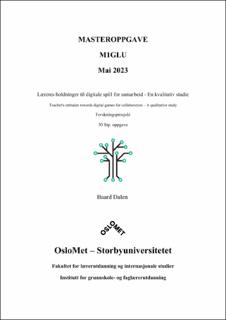Læreres holdninger til digitale spill for samarbeid - En kvalitativ studie
Abstract
I denne masterbesvarelsen blir bruken av digitale spill og samarbeid i skolen tematisert. Digitale spill viser seg å være en stor interesse for barn, og at 86% av 9-18 åringer spiller dataspill. Digitale spill i undervisning har også vært et tema som hyppig har blitt inkludert i nyheter om skole. Dette var noe som fungerte pådrivende for undersøkelse av hva læreres holdning til bruken av digitale spill i undervisning er. Problemstillingen som blir besvart er hva er holdningene til lærere på mellomtrinnet om bruk av digitale spill som et verktøy for samarbeid? Denne problemstillingen blir besvart ved å se nærmere på hvilke faktorer som muliggjør eller hindrer bruk av digitale spill på skolen, samt hvilke erfaringer lærere har med bruk av spill i og utenfor skolen, og hvordan skoler fasiliterer for utviklingsarbeid av digital kompetanse. Metoden som ble brukt for å innhente data var intervju av tre lærere på mellomtrinnet. Lærerne har forskjellig arbeidserfaring og åpnet for forskjellige synspunkt om tematikken. Intervjuet er blitt analysert ved hjelp av tematisk analyse der funnene er at lærerne viser en delvis positiv holdning til bruk av spill i skolen. På den andre siden er det flere faktorer som spiller inn i bruken, som både kan virke hindrene og muliggjørende. Funnene kan tyde på at det er behov for utvikling av digital kompetanse hos lærerne slik at det blir mulig å nyttiggjøre seg av ressursen digitale spill kan være for elevene. Et annet funn som kommer fram er skolens utviklingsarbeid der lærerne etterspør mer informasjon om ressurser de har tilgang til, samt arbeidsmetoder i et profesjonsfellesskap.
In this master's thesis, the use of digital games and collaboration in school is thematized. Digital games prove to be of great interest to children, and that 86% of 9-18 year old’s play computer games. Digital games in education have also been a topic that has frequently been included in news about school. This was something that acted as a driving force for investigating what the teachers' attitudes towards the use of digital games in education is. The research question to be answered is what the attitudes of middle school teachers about the use of digital games as a tool for collaboration are. This research question is answered by taking a closer look at the factors that enable or prevent the use of digital games at school, as well as what experiences teachers have with the use of games inside and outside school, and how schools facilitate the development of digital competence. The method used to collect data was an interview with three teachers at 5-7th grade. The teachers have different work experience and opened up to different points of view on the subject. The interview has been analyzed using thematic analysis where the findings are that the teachers show a partly positive attitude towards the use of games in school, but that there are several factors that play a role in the use, which can act as both obstacles and enablers. The findings may indicate that there is a need for the development of digital competence among teachers so that it becomes possible to make use of the resources that digital games can be for students. Another finding that emerges is the school's development work, where the teachers request more information about resources they have access to, as well as methods of learning in a professional community.
